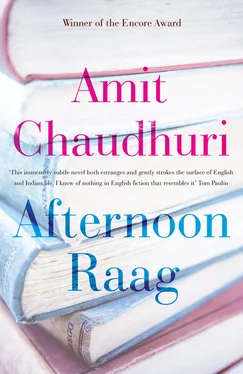Amit Chaudhuri
Afternoon Raag
In memory of Pandit Govind Prasad
Jaipurwale (1941–1988)
The doorbell rings. The music-teacher comes in.
He is smiling as usual. His body is smiling. He is humming a complicated tune
outside, wind, light and rain revolve the landscape in a shifting treadmill of shadow.
Inside, in the cool room, my mother and the music-teacher sit on the carpet, as usual,
enclosed, in the drawing-room, by sofas and tables and paintings and curios.
My mother plays the harmonium; she begins to sing.
Her fingers on the black and white keys make, of her hand, a temple with many doors.
When the music-teacher joins in intermittently, he shows what a strange thing the human voice is,
this tiny instrument in the throat, with its hidden universe of notes, its delicate, inscrutable laws.
A raag, spacious as the mansion the rain builds, enfolds — and sighs, like one of the elements.
Inside the great architecture of the raag, through the clear archway of notes, world without humans,
two figures sit, each alone
— my mother and the music-teacher — enclosed by sofas and paintings and curios.
The music teacher is listless today. He does not respond.
My mother is just a little irritated as she sings, but she is afraid, too, of something she does not understand.
The music-teacher has merged with the sofa behind him, momentarily indistinguishable from the soft, indifferent contours of the furniture,
with the disturbing patience and resignation of furniture.
His wife, his widowed mother, his brother, his brother-in-law, his sister, his four children,
the jewelled constellation that appeared at his birth,
are moving away from him. He is alone, sitting on the carpet, leaning his back against the sofa.
Behind this moment of serenity in this small, calm room,
with its clear, cool space flowing in and out of a listlessness,
is something liquid and grieving, something that cannot tolerate its own shimmering presence,
but melts away from itself all the time, like the giant walls of rain, or tears, or something else.
The music-teacher is dying.
He does not know it, but he will be dead in less than a year’s time.
He will not see the rain again.
He does not know it. His ignorance of death surrounds him like a halo, an intimacy with God.
My mother does not know it.
The rain does not know it.
The world is being washed clean by the rain. Something in us, human but one with the season,
is also being washed clean, tear after tear, cloudburst in silence.
Nothing remains but the human voice, this tiny instrument inside the throat
endeavouring to carry a world inside it. Then, that too becomes silent.
The raag, self-created galaxy of notes, sigh of the elements, sighs like the rain, passes into nature.
We do not see him. My mother goes on singing, as if unaware. He moves further away, not drawing attention to himself.
We do not see him now, except as a shadow against the sofa,
merged with the furniture, the endless meditation of furniture,
his lungs filled with water, his face and feet swollen and his mouth smiling,
become one with the reverie of furniture.
My mother sits there, singing, the rain falls, melting from its own presence,
the moment perfected not by art but by mortality, the mortal moment, repeating and repeating its own life.
Each year, in Oxford, new students come and old ones disappear; after a while, one knows the streets and by-lanes, all of which lead to each other, by heart; in the north, no one goes beyond Summertown, and the road leading to London goes out via Headington. On the first day of Michaelmas, men and women in black gowns walk to matriculation ceremonies, and at the end of the year they wear these gowns again, unhappily, to take exams; then, after the exams, the town is nearly empty, and the days, because of that peculiar English enchantment called Summer Time, last one hour longer; and Oxford, in the evening, resembles what an English town must have looked like in wartime, the small shops open but unfrequented, an endangered, dolorous, but perfectly vivid peace in the lanes, as the eye is both surprised by, and takes pleasure in, a couple linked arm in arm, or a young man conversing with a woman on a polished doorstep, and then the early goodbyes. It is like what I imagine a wartime township to have been, because all the young people, with their whistling, their pavement to pavement chatter, their beer-breathed, elbow-nudging polemics, are suddenly gone, leaving the persistent habits of an old way of life, the opening and shutting of shops, intact, a quiet, empty bastion of civilization and citizenry. It is because of its smallness, repetition, and the evanescence of its populace, that Oxford is dreamlike.
From the window of my room I could see a library and a faculty building, and a path, curving slightly, that led to a college. Students, dressed in the oddest of clothes, in secretive overcoats, in long and black primitive skirts, men with earrings, women wearing gypsy ornaments, would gather each morning for lectures, or pass in and out of doors recklessly with books clutched to their bosoms, or sit on the steps in abandonment, as if they had forgotten their appointments. The path, which is flanked by hedges that turn bright red in the autumn, I could see far into; at one point, it ran over a canal, so that I sensed water there. This intuition of water came to me again when I was visiting Worcester College; it was an unhappy day, because I was still vacillating between Mandira and Shehnaz, falling asleep by one woman at night and spending the day with the other, but I had, for a forced, lucid period of time, come here to attend a seminar on Lawrence. On entering the first quad, I saw that the light — it was evening — behind the wall at the end of the garden was different; as if the sun had set there, so that I imagined a seashore and a horizon. Later, I learnt that there was a lake there.
Dr Mason’s room was simple, with two sofas, adjacent to each other, and a study table, next to which there was a chair on which he sat. It was a well-lighted and warm room, but its colours were cool — furniture browns and wallpaper purples and magnolias and greys, the colours that create, in afternoon light or evening shadow, the abidingness of an English interior. Three undergraduates, myself, and two other graduate students, sat on the sofa, while another undergraduate, bearded and with spectacles, placed himself on the window-sill and never said a word, but listened to the others’ words, seeming to weigh them, and it was his silence that I deciphered for agreement or disapproval. Dr Mason was a polite, even kind, man, a very big man, not very old, facing us in his armchair. Some students had open copies of The White Peacock in their hands, and as we talked of Lawrence, extolled him, applauded him, and most invigoratingly of all, corrected him, it seemed both strange and natural to hear our own voices. The mind focused itself upon the sphere of the room and the table lamp, and then dilated vaguely and darkly into a consciousness of Lawrence-country, and then focused upon the room again, and this dilation and constriction went on for a long time, like breathing. An hour later, we got up to leave. There was laughter, and a relaxed certainty with which we let each other go, almost released each other, into the night. How unique student life is, with its different rooms, its temporary enclosures and crystallizations, its awareness and memory of furniture and windows and spaces.
Early in the morning, light would frame the curtains of my window, although at times there was only a dull whiteness. When I parted the curtains, I would look out into the curving road to the next college, the closed doors of the library, and the pavements. The wind would make a piece of paper move, and, touching the window, I would sense the cold outside. As I am used to the sound of crows in the morning, this absence of noise would fill me with a melancholy which was difficult to get rid of because it seemed to have no immediate cause. It was only when I saw students, with their odd, comical gait, and their touchingly disguised sleepiness, walking down that road, growing, little by little, in number as the morning wore on, that I would feel an at-homeness and pleasure in their rhythm. It was around this time that Shehnaz too would set out from her college and come down the same road, indistinguishable from the other students, but with her own thoughtful gait, a backward-lookingness, happy in a simple way in having this opportunity to walk to her library in Broad Street, and devote a fresh day to copying out notes, stopping at my room for half an hour on her way there.
Читать дальше












